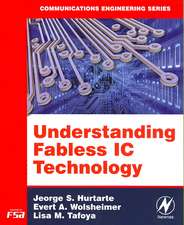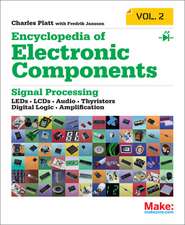Hardware-dependent Software: Principles and Practice
Editat de Wolfgang Ecker, Wolfgang Müller, Rainer Dömeren Limba Engleză Hardback – 30 ian 2009
| Toate formatele și edițiile | Preț | Express |
|---|---|---|
| Paperback (1) | 641.20 lei 6-8 săpt. | |
| SPRINGER NETHERLANDS – 19 oct 2010 | 641.20 lei 6-8 săpt. | |
| Hardback (1) | 647.59 lei 6-8 săpt. | |
| SPRINGER NETHERLANDS – 30 ian 2009 | 647.59 lei 6-8 săpt. |
Preț: 647.59 lei
Preț vechi: 761.87 lei
-15% Nou
Puncte Express: 971
Preț estimativ în valută:
123.94€ • 129.05$ • 104.74£
123.94€ • 129.05$ • 104.74£
Carte tipărită la comandă
Livrare economică 10-24 martie
Preluare comenzi: 021 569.72.76
Specificații
ISBN-13: 9781402094354
ISBN-10: 1402094353
Pagini: 316
Ilustrații: XII, 299 p.
Dimensiuni: 155 x 235 x 28 mm
Greutate: 0.62 kg
Ediția:2009
Editura: SPRINGER NETHERLANDS
Colecția Springer
Locul publicării:Dordrecht, Netherlands
ISBN-10: 1402094353
Pagini: 316
Ilustrații: XII, 299 p.
Dimensiuni: 155 x 235 x 28 mm
Greutate: 0.62 kg
Ediția:2009
Editura: SPRINGER NETHERLANDS
Colecția Springer
Locul publicării:Dordrecht, Netherlands
Public țintă
ResearchCuprins
Hardware-dependent Software.- Basic Concepts of Real Time Operating Systems.- UEFI: From Reset Vector to Operating System.- Hardware Abstraction Layer.- HW/SW Interface.- Firmware Development for Evolving Digital Communication Technologies.- Generation and Use of an ASIP Software Tool Chain.- High-Level Development, Modeling and Automatic Generation of Hardware-Dependent Software.- Accurate RTOS Modeling and Analysis with SystemC.- Verification of AUTOSAR Software by SystemC-Based Virtual Prototyping.
Recenzii
From the reviews:
"This book … fill the need for software developers to understand more about hardware, and for hardware developers to understand the kind of applications their equipment will run. The ten-chapter work … gives the book the feeling of a collection of research papers. … each chapter includes a good set of references. The book includes hardware diagrams with associated software paths, and fragments of C code demonstrate various applications. Useful as a reference source … . Summing Up: Recommended. Upper-division undergraduate through professional collections." (H. J. Bender, Choice, Vol. 47 (1), September, 2009)
"This book … fill the need for software developers to understand more about hardware, and for hardware developers to understand the kind of applications their equipment will run. The ten-chapter work … gives the book the feeling of a collection of research papers. … each chapter includes a good set of references. The book includes hardware diagrams with associated software paths, and fragments of C code demonstrate various applications. Useful as a reference source … . Summing Up: Recommended. Upper-division undergraduate through professional collections." (H. J. Bender, Choice, Vol. 47 (1), September, 2009)
Textul de pe ultima copertă
Hardware-dependent Software (HdS) plays a key role in desktop computers and servers for many years. Mainly due to its flexibility, the possibility of late change, and the quick adaptability, the relevance of HdS in the domains of embedded systems and in Systems-on-Chip (SoCs) has significantly increased.
Despite its importance, the role of HdS is most often underestimated and the topic is not well represented in literature and education. To address this, Hardware-dependent Software brings together experts from different HdS areas. By providing a comprehensive overview of general HdS principles, tools, and applications, this book provides adequate insight into the current technology and upcoming developments in the domain of HdS. The reader will find an interesting text book with self-contained introductions to the principles of Real-Time Operating Systems (RTOS), the emerging BIOS successor UEFI, and the Hardware Abstraction Layer (HAL). Other chapters cover industrial applications, verification, and tool environments. Tool introductions cover the application of tools in the ASIP software tool chain (i.e. Tensilica) and the generation of drivers and OS components from C-based languages. Applications focus on telecommunication and automotive systems. For automotive systems, two approaches for SystemC-based verification are presented.
Despite its importance, the role of HdS is most often underestimated and the topic is not well represented in literature and education. To address this, Hardware-dependent Software brings together experts from different HdS areas. By providing a comprehensive overview of general HdS principles, tools, and applications, this book provides adequate insight into the current technology and upcoming developments in the domain of HdS. The reader will find an interesting text book with self-contained introductions to the principles of Real-Time Operating Systems (RTOS), the emerging BIOS successor UEFI, and the Hardware Abstraction Layer (HAL). Other chapters cover industrial applications, verification, and tool environments. Tool introductions cover the application of tools in the ASIP software tool chain (i.e. Tensilica) and the generation of drivers and OS components from C-based languages. Applications focus on telecommunication and automotive systems. For automotive systems, two approaches for SystemC-based verification are presented.
Caracteristici
To our knowledge, this is the first complete book on hardware-dependent software, a critical topic in embedded system design Comprehensive introductions HdS coverage with many applications Examples from industrial automotive and communication designs Includes supplementary material: sn.pub/extras















